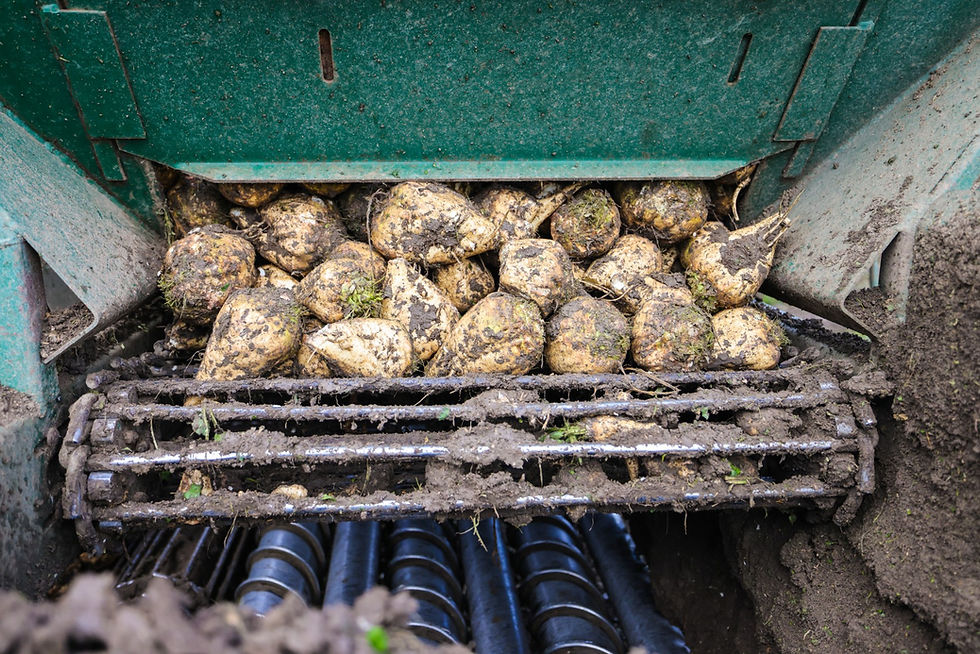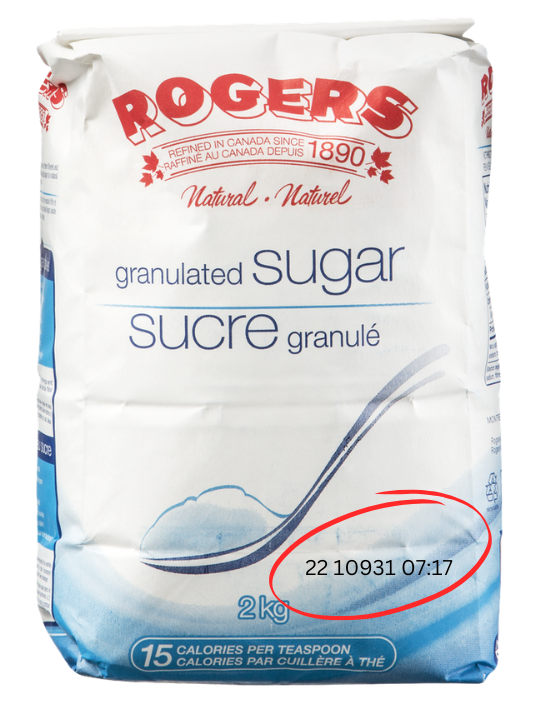
The Plant
Sugar Beets
Sugar beets are powerhouse root crops that, alongside sugar cane, supply a major share of the world’s refined sugar. Grown in regions like northern Europe, the United States, and Canada, they’re easy to spot by their thick, white taproots packed with sucrose. Thanks to this high sugar content, each beet can be transformed into products like granulated sugar, icing sugar, molasses, and even beet pulp. Typically harvested from April through October, sugar beets weigh between 3 to 5 pounds and boast a sugar content of 18–20%. Amazingly, when first cultivated, they held just 6% sugar—proof of how far they’ve come through selective breeding and innovation.

Sugar beets directly harvested from a field in Alberta.

100% Canadian sugar, proven by the "22" stamp.
Sugar Beets in Canada
Today, sugar beet farming in Canada takes place exclusively in Alberta and Ontario—remnants of what was once a thriving industry nationwide. In Alberta, the beets are processed at the country’s last remaining sugar beet refinery, located in Taber. The resulting sugar is packaged and sold under the Rogers Sugar brand. Want to know if your sugar is truly Canadian? Check the black factory stamp on the bag—if it starts with ‘22,’ you’re holding 100% Canadian-grown sweetness.
Refining Sugar Beets
The journey from sugar beet to sweetener starts with a thorough wash and a quick chop into thin strips. These strips are then boiled, releasing their natural sucrose into a liquid extract. From there, the extract is purified and evaporated into a thick juice containing about 60% sugar. This rich juice is filtered, crystallized, and dried to create the familiar granulated sugar we use every day. While the crystals are packaged for sale, the leftover syrup and strips are put to good use—transformed into molasses and beet pulp, a nutritious, high-fiber feed for livestock.

Rogers Sugar factory in Taber, Alberta


An sugar beet crop and its farm family in Alberta
Why Sugar Beets?
All Alberta sugar beets are also Farm Sustainability Assessment (FSA) certified at the Silver level by the Sustainable Agriculture Initiative (SAI) platform. The FSA certifications are independently audited and cover 17 fundamental components of sustainable agriculture. Farms are then ranked (Bronze, Silver or Gold levels) according to their alignment with these components. We are very proud of our strides towards further sustainability, and the widely recognized FSA certification speaks to both how our sugar beets are grown and the farmer’s overall operations.
Why Sugar Beets?
Many sugar beet farms in Alberta are run by multi-generational family farmers who have devoted their lives to growing Canada’s sugar. When you support sugar beet farming, you’re backing generations of hard-working Canadians who contribute to our food system and economy in a sustainable way. Farming remains a cornerstone of the Canadian economy—and ensuring the future of these farmers is key to the sustainability of the entire industry.
Why Sugar Beets?
Sugar beets account for roughly 8% of all the sugar consumed in Canada, with Alberta leading the way—producing about 75% and refining it right here at home. The remaining 25% comes from Ontario, with beets sent to Michigan for processing. In Alberta alone, the sugar beet industry supports over 2,150 Canadian jobs and contributes an impressive $248.61 million to the province’s GDP. From economic growth to filling our grocery store shelves, sugar beets play a vital role in Canada’s food system.
Why Sugar Beets?
Sugar beets are an efficient, environmentally conscious crop—using less water and land on average than cane sugar. In Canada, they’re irrigated through precise, controlled water delivery systems that minimize waste. Farmers also rely on advanced seeding technology that reduces manual labour, chemical use, and the environmental footprint of tilling and repeated spraying. Studies show that cane sugar typically requires more water and land per kilogram of sugar than sugar beets, although results can vary by region. Simply put, sugar beets offer a smarter, more sustainable way to grow sweetness.